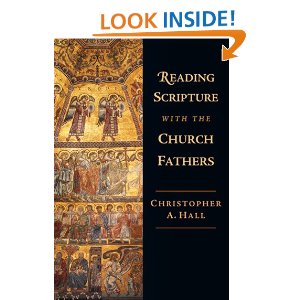Before people jump to the conclusion, “He’s just a Protestant so what does he know?” please let me finish the review then you can start throwing objections and seeing what sticks.
Christopher Hall argues that Evangelicals should make the Church Fathers routine conversation partners in our interpretation of Scripture. Not to make them the last word, since much of their exegesis is rather forced, but because a regular *re*reading of the Church Fathers provides an important epistemological service: it forces us to examine our own presuppositions and culture as we come to the text.
What is a Church Father? Admittedly, any definition of this term is somewhat arbitrary. Hall summarizes the definition along the lines of someone who has received traditional teaching (Hall 50; cf Irenaeus) and faithfully preserved conciliar conclusions. A Church father must have antiquity, holiness of life (although this can be stretched when it comes to things like temper and gentleness) and orthodox doctrine. Granted, a number of questions are begged at this point, but we must move on.
Hall then survey eight fathers: four Eastern (Athanasius, Nazianzus, Basil, and Chrysostom) and four Western (Ambrose, Augustine, Jerome, and Gregory the Great) and points the reader to certain works. Much of this section is a summary of what you would find in textbooks on the Nicene and post-Nicene period. I won’t go into it here.
He then contrasts the allegorizing of Alexandria with the more literal approach of Antioch. And while I know that men like Chrysostom rejected the allegorizing approach, I didn’t know how widespread such a rejection was. Hall gives the standard reasons why all allegories (possibly excluding Paul’s unique usage) are doomed to failure: allegories by definition are impossible to falsify.
What can we take from the Church Fathers? Unlike modern academic tendencies, they did not divorce the reading of Scripture and the doing of theology from liturgy (happily, with the coming demise of the German-based post-graduate system in America, we might be approaching a period when this is possible).
Even more, the Fathers had mnemonic powers that Americans can only dream of. This allowed them to be remarkably sensitive to motifs in Scripture that a concordance might miss. While Hall doesn’t cover this, to be a bishop in the ancient church one must have memorized the entire Psalter. (And later, to be a Cossack warrior in Russia one must also have memorized the Psalter. When you get captured by Muslimists chanting the Psalter would help you endure torture).
And to be honest, if you want to memorize large chunks of Scripture, you probably need to chant it. Not recite it nor re-read it, but chant it. That’s likely why John Chrysostom had the entire Bible memorized.
As a whole the book is outstanding. Some repetition and for those who have read widely on the Nicene debates, parts of the book can be skipped. On the other hand, this is probably the best introduction to the Church Fathers.
- More often than not they are not asking the same questions–and this is a historical inevitability that cannot be helped.
- With the exception of Chrysostom and a few others, most did not go systematically through the Bible. This means if you want an exposition of your favorite verse, odds are it won’t be there or it won’t be developed in any real length.
- I also believe that the church fathers would have rejected this quasi-infallibility that we place on them. Yes, they themselves tended towards it in their hagiography (interesting side note: Gregory Nazianzus called Athanasius the Pope of the entire world. Boy, that has ecumenical ramifications! LOL).
So again, what point the church fathers?
- They can teach humility in reading past theology. Of course, Orthodox interlocutors will call foul at that point since I don’t seem like the most humble person. Fair enough, but I am only sharp when people advance theologies that attack my hope in Christ’s saving me. If anyone denies that Yeshua gave me his Holy Spirit as a down payment and that my sacraments are graceless, well then…
- What I mean by the above is that we should be careful of throwing heresy charges because people don’t believe what we believe at a later date. Be careful of calling heresy what would condemn earlier fathers of heresy.




















